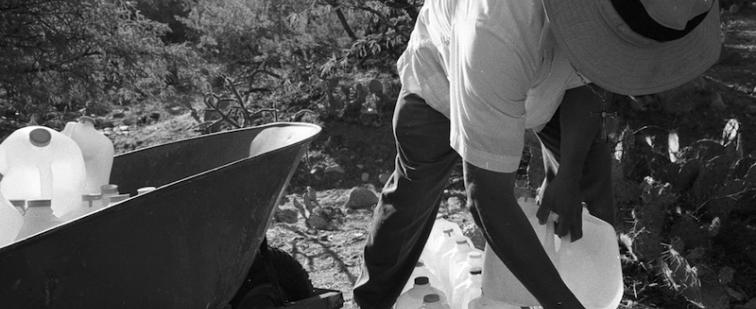Home
Soon after the June coup in Honduras, the de facto government unleashed a vigorous PR campaign against ousted president Manuel Zelaya, accusing him of being involved in drug trafficking. This linking of Zelaya to drugs remained a prominent feature of the coup government’s propaganda during its seven-month reign, and offers an insight into the the many political uses of the drug war in the Americas, even to justify the overthrow of a democratically elected president.
Brazil’s former president Fernando Henrique Cardoso visited Cornell University on April 7 to give a lecture, talk to the press, and receive yet another academic award. The onetime Marxist sociologist, now the political leader of the centrist Brazilian Social Democratic Party (PSDB), and one of the North’s favorite neoliberal statesmen, Cardoso commands boundless respect in the international arena. He frequently airs his views in editorial pages and lecture podiums all over the world, but back in Brazil, Cardoso inspires rather less awe, which could have an impact on Brazil's upcoming election.
Proclaiming its lithium deposits to be a permanent reserve of the state, the Bolivian government last month authorized a new state company to undertake “the full chain of lithium production,” including “exploration, development, industrialization, and marketing.” At issue is the future of Bolivia’s vast Uyuni salt flats, the world’s largest untapped lithium reserve, holding at least 5.4 million tons—almost half the world’s known supply. Also at stake is a potentially significant source of wealth and an alternative development model that, if successful, could bring substantial benefits to Bolivia’s impoverished population.
On February 25, José Armando Palacios and José Alberto Vicente Chávez, along with their families, filed a lawsuit against the Coca-Cola Company in the New York State Supreme Court. The company is accused of allowing its bottling and processing plants in Guatemala to engage in a campaign of violence against the two men, both prominent union leaders. Though Coke claims the U.S. legal system is being manipulated, the prosecution maintains that Guatemala’s courts, rife with impunity, are incapable of delivering justice.
No other country in the world has more non-governmental organizations (NGOs) per capita as Haiti. After the January 12 earthquake these NGOs received the bulk of the global relief funds, while the Haitian government, regularly accused of corruption by the U.S. State Department, has remained marginalized in the recovery and rebuilding efforts. This leaves a country where unelected organizations, unaccountable to the Haitian people, are calling the shots and accused of profiting from the poverty they are entrusted to fight.
When Bolivia’s president, Evo Morales, was sworn in to a second term in January, he proclaimed Bolivia a plurinational state that would construct “communitarian socialism.” In an accompanying address, Vice President Álvaro Garcia Linera, envisioned a "socialist horizon" for Bolivia, characterized by “well-being, making the wealth communal, drawing on our heritage . . .” The process “will not be easy, it could take decades, even centuries, but it is clear that the social movements cannot achieve true power without implanting a socialist and communitarian horizon.”
Most are in their 80s. They include an optician, a pilot, a teacher, a bank clerk, and a lawyer. Privately, they all suffered the loss of a son, daughter, or, in some cases, two or three children, during the repression of the military dictatorship that ruled Argentina from 1976 to 1983. And during this year’s 34th anniversary of the 1976 coup, Argentine president Cristina Fernández de Kirchner honored four of them for their human rights work during the past three decades.
Mexico's Supreme Court has upheld the constitutionality of a legal reform that limits the amount of information the federal Attorney General's Office (PGR) must hand over to the government's National Human Rights Commission (CNDH). The CNDH argues that the new law impedes its access to evidence with investigations into PGR officials, especially from the Federal Ministerial Police, who have allegedly committed many human rights abuses in the war on drugs. Washington, however, has taken very little notice of this lack of "transparency and accountability," even though it is one of the human rights conditions included in the Merida Initiative.
In March, Brazilian president Luiz Inácio Lula Da Silva controversially called for an end to the hunger strike by Cuban dissident and political prisoner Guillermo Fariñas, asking him and other prisoners to respect the course of justice in Cuba. Lula's detractors decry his comments as proof of a weak commitment to human rights and promotion of democracy abroad. But despite the clumsy public justification, Lula’s position on the Fariñas affair is underpinned by a no-nonsense pragmatism that has converted Brazil into Latin America’s new heavyweight.
Since taking office in 2006, Peruvian President Alan Garcia has initiated an aggressive economic development strategy focused on opening up Peru’s natural resources to international extraction corporations, often in the face of large-scale protests and organized campaigns. The administration has responded with efforts designed to criminalize the opposition’s actions via newly enacted legislation, while simultaneously beefing up the country’s private security sector and authorizing the wider deployment of Peru’s military forces. The government has coupled these efforts with an aggressive propaganda campaign that links protestors to armed groups as a justification for increasing the national security presence in regions that are attractive to foreign investors.












